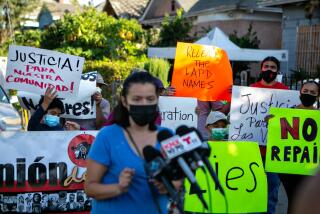ACLU Sues to Curtail Use of Battering Ram
The American Civil Liberties Union filed suit Thursday to stop the Los Angeles Police Department from using a motorized battering ram and explosive devices to break into suspected drug “rock houses.”
Such actions violate state and federal constitutional protections against excessive force, violation of privacy and unreasonable search and seizure, ACLU attorney Jane Howarth said at a press conference to announce filing of the Los Angeles Superior Court suit.
Howarth said she would not object to the use of the battering ram and explosive devices against a sniper or against a person who has taken hostages, but she added: “We don’t want them used to serve a search warrant unless it is necessary to prevent imminent serious injury or death.
“These military devices create such a substantial risk of serious injury or death when used to storm an occupied residential dwelling that they constitute dangerous weapons whose use must be restricted as such,” the lawsuit said.
Howarth said the ACLU is working to gather evidence enabling lawyers to go to court to seek an injunction against use of the tactics “in the near future.”
The suit seeks to recover unspecified monetary damages for Dolores Langford and her sons, Dyvon, 9, and Eddie, 4, who were visiting a Pacoima home chosen by police for the Feb. 6 debut of the 14-foot steel battering ram attached to a converted armored personnel carrier.
With Police Chief Daryl F. Gates aboard, the vehicle smashed down the wall of a room. Inside, police found Langford, her two sons and the home’s occupants, Linda Brown Johnson and her son, Marquise.
Police, who found a small quantity of drugs in the house, said they had been unaware that children were inside.
None of the occupants was hurt, but Langford, who attended the ACLU news conference with her sons, said she and her children have been fearful since the raid. She said her son Eddie’s asthma was made worse by the explosive devices police threw into the house to create a diversion during the raid.
Both children are now afraid to go to bed alone and Eddie asks “Is that the police?” every time someone knocks at the door, Langford said.
The suit says the battering ram was used “in callous disregard of the consequences to the occupants” and was part of the Police Department’s “continuing pattern and practice” of using such weapons in minority neighborhoods.
Police spokesman Cmdr. William Booth said Thursday, however, that use of the battering ram is not a constitutional or a racial issue.
“Are we going to say to drug dealers that if they encase their house in enough steel, it is a sanctuary for dealing death to the community?” Booth asked rhetorically.
The Police Department has used the battering ram once since that raid. That was Feb. 13 in South-Central Los Angeles, where the raiding party was applauded by neighborhood residents.
Barring a court prohibition, Booth said, police will not stop using the battering ram. Police say the device is necessary to gain entrance to the fortress-like residences used by heavily armed cocaine dealers without harming officers or residents.
Use of the battering ram was harshly criticized by Pacoima civic, religious and civil rights leaders. Carrying placards and singing “We Shall Overcome,” more than 100 Pacoima residents attended the Feb. 11 Police Commission meeting to ask the panel to limit use of the battering ram and publicly reprimand Gates.
At Tuesday’s Police Commission meeting, South Los Angeles resident Jesse Samuels presented a petition that she said contained the signatures of 883 community members who support the use of the battering ram to close rock houses, police officials said.
In a related development, the district attorney’s office announced Thursday that it is rejecting the last remaining criminal case resulting from the Pacoima raid.
District attorney’s spokesman Al Albergate said there is insufficient evidence to file charges against Johnson’s husband, Antonio. He was not home at the time of the raid but arrived shortly afterward and was arrested on suspicion of sale of cocaine based upon an earlier sale to an undercover informant, police said.
Deputy Dist. Atty. Christine Thurman rejected the case because the quantity of cocaine found during the raid, a tenth of a gram, was insufficient to be used in court and because it was impossible to establish that the cocaine belonged to Johnson, Albergate said.
Earlier, the city and district attorney’s office declined to prosecute Linda Brown Johnson, who was arrested on suspicion of felony child endangering.
The ACLU lawsuit also cited the December, 1984, death of Lessie R. Haynesworth, a 45-year-old woman killed by an explosive device used in the raid of a suspected South-Central Los Angeles “rock house”--the term used for fortified dwellings from which cocaine often is sold in solid rock form.
More to Read
Sign up for Essential California
The most important California stories and recommendations in your inbox every morning.
You may occasionally receive promotional content from the Los Angeles Times.










